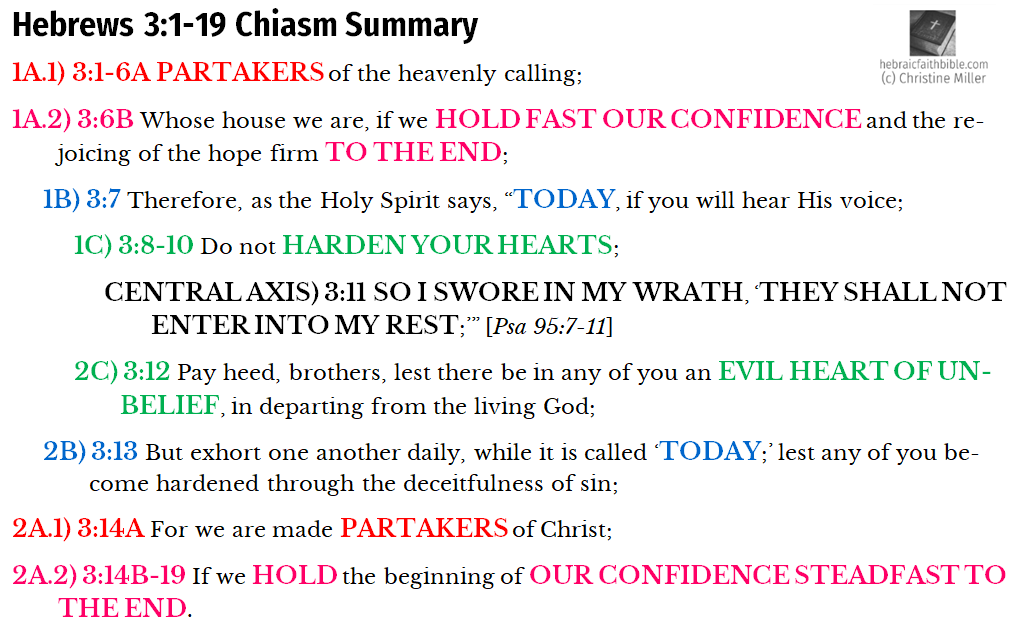Read Hebrews 3 here (text coming …) or at Bible Gateway.
Heb 3:1-19 Chiastic Structure (and Expanded Chiasm pdf);
The 2a.2 pair, Heb 3:14b-19, makes this ⇓ Chiastic substructure, where confidence is Contrasted with unbelief:
1a) 3:14b-15 If we hold the beginning of our confidence steadfast to the end, 15 while it is said, “Today if you will hear His voice, harden not your hearts, as in the provocation;”
central axis) 3:16-18 For who, when they had heard, rebelled? Was it not all that came out of Egypt led by Moses? 17 But with whom was He grieved forty years? Was it not with those who had sinned, whose bodies fell in the wilderness? 18 And to whom did He swear that they should not enter into His rest, but to those who did not believe?
2a) 3:19 So we see that they could not enter in because of unbelief.
Confidence is Strong’s G5287, ὑπόστασις hypostasis, a compound of two Greek words, hypo = “under,” and stasis = “stand, establish,” that is, something under you which supports you so that you can stand upright. The translators of the Hebrew Bible into Greek used hypostasis for the Hebrew Strong’s H8615, tiqvah, an abstract concept meaning “hope, expectation,” from Strong’s H6960, קוה qavah, a primary verb meaning, “to wait, to expect.” The 3-letter root is quph + vav + hey.
quph ק = sun on the horizon, thus condense, circle, time
vav ו = the tent peg, thus add, secure, hook
hey ה = man with upraised arms, thus exclaim, reveal, wonder, worship, breath
The story the Hebrew Root Word is telling, is of measuring time (quph, as sunset measures one day from another), secure (vav) in Him to whom we look (hey).
Unbelief is Strong’s G570, ἀπιστία apistia, also a compound word, a = “not,” and pistos = “faith, trust.” The translators used pistos for the Hebrew Strong’s H539, אמן aman, a primary verb meaning, “to support, to stand firm, to believe.” The 3-letter root is aleph + mem + nun.
aleph א = the ox head, thus strength, power, leader
mem מ, ם = the water, thus chaos, mighty, blood
nun נ, ן = the seed, thus continue, heir, son
According to the Ancient Hebrew Lexicon, ancient people used to put animal hides in a pot of boiling water, and skim off the thick substance that formed at the surface. This strong (aleph) water (mem) was used as glue (and is still the basis of glue production today). In fact the concrete noun in Hebrew that comes from the verb is “glue.” The story being told is of the bond (aleph + mem) that continues (nun). The Hebrew language defines the abstract concept of “belief” as ideas or truths that stick with us continually.
Unbelief, then, is not to stand firm. In the modern way of thinking, what someone believes or does not believe is a matter of assenting or not to a mentally-affirmed supposition, having nothing to do with how we live or what we do. But in reality, when someone does not act on their mentally-affirmed supposition, then they do not truly believe it. To go to the edge of the Promised Land, and then refuse to go in, is to not act on their mentally-affirmed supposition that God would give them the land promised to their fathers.
To hold our confidence steadfast to the end, is to stand firm in what we believe, no matter what, to the end. To the end of what? To the end of the waiting period, when we finally see or receive that which we have been expecting. And what we are expecting, as the writer of Hebrews reveals, is that
… through death He might destroy him who had the power of death, that is, the devil; and deliver those who through fear of death were all their lifetime subject to bondage. Heb 2:14b-15
We no longer fear death, because through Yeshua’s death we have been delivered from death and its fear, since for us death is merely the crossing of the threshold from this life to the next, eternal life with God.


















Leave a Reply